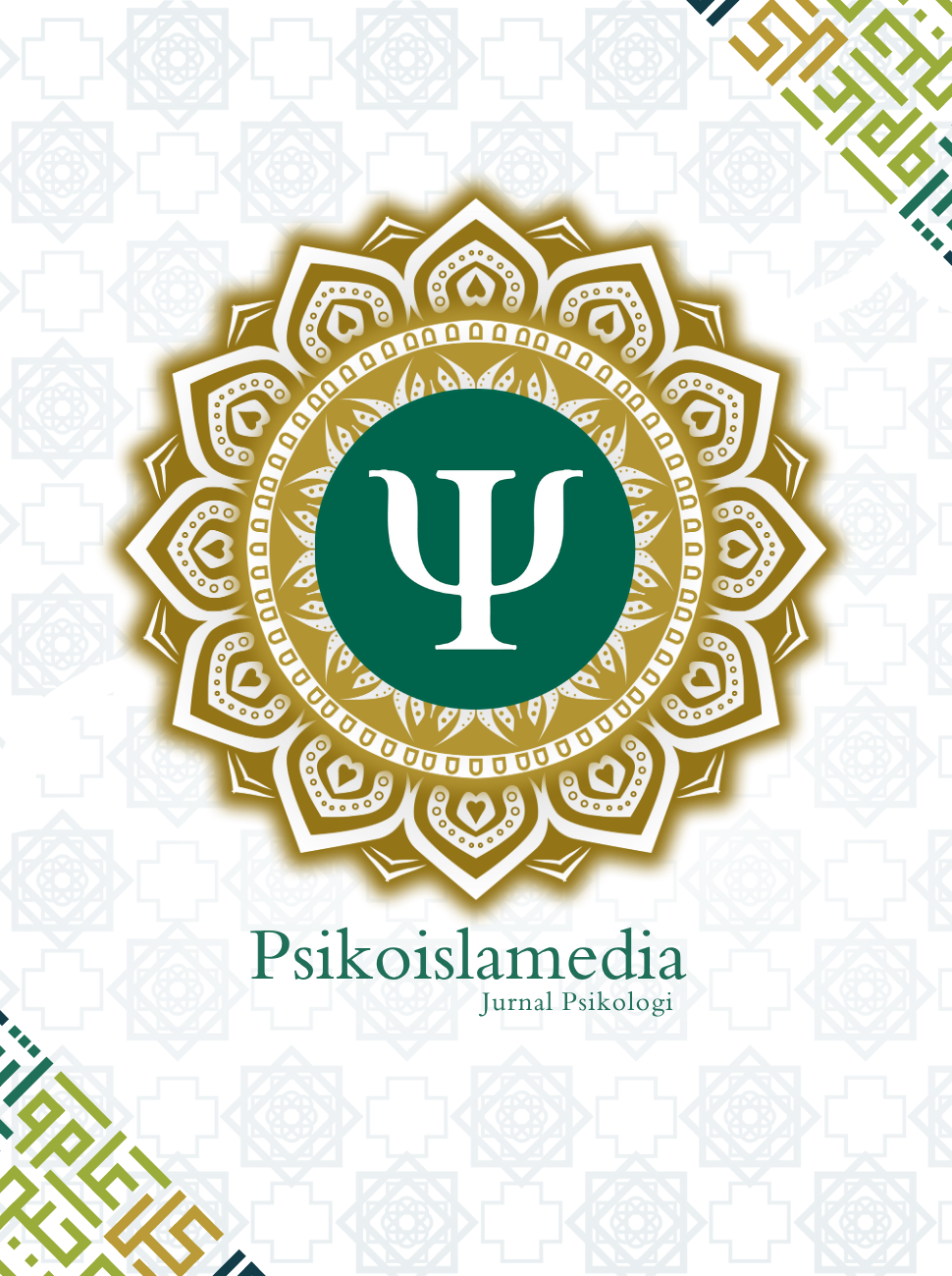THE ROLE OF GRIT AGAINTS FLOURISHING OF FINAL-YEAR STUDENTS (PERAN GRIT TERHADAP FLOURISHING PADA MAHASISWA TINGKAT AKHIR)
DOI:
https://doi.org/10.22373/psikoislamedia.v7i1.10840Keywords:
flourishing, grit, mahasiswa tingkat akhirAbstract
Mahasiswa tingkat akhir menghadapi berbagai kesulitan, tuntutan, tekanan dan kegagalan yang dapat menghalangi mereka dalam mencapai flourishing. Tujuan dari penelitian ini adalah untuk mengetahui peran grit terhadap flourishing pada mahasiswa tingkat akhir UIN Sayyid Ali Rahmatullah. Penelitian ini menggunakan metode penelitian kuantitatif. Responden yang digunakan dalam penelitian ini adalah 255 mahasiswa semester 8 dari 4 fakultas UIN Sayyid Ali Rahmatullah, yang di pilih dengan menggunakan teknik cluster sampling. Hipotesis yang diajukan adalah adanya peran grit terhadap flourishing pada mahasiswa tingkat akhir UIN Sayyid Ali Rahmatullah. Pengumpulan data menggunakan skala grit dan skala flourishing, serta data di analisis menggunakan uji regresi sederhana. Hasil penelitian menunjukkan bahwa grit berperan positif dan signifikan terhadap flourishing pada mahasiswa tingkat akhir UIN Sayyid Ali Rahmatullah. Artinya jika grit meningkat, maka flourishing pada mahasiswa tingkat akhir juga meningkat, begitupun sebaliknya.
References
Akbağ, M., & Ümmet, D. (2017). Predictive role of grit and basic psychological needs satisfaction on subjective well-being for young adults. Journal of Education and Practice, 8(26), 127–135.
Andarini, S. R., & Fatma, A. (2013). Hubungan antara Distress dan Dukungan Sosial dengan Prokrastinasi Akademik pada Mahasiswa dalam Menyusun Skripsi. Talenta Psikologi, 2(2), 159–180.
Arif, I. S. (2016). Psikologi Positif: Pendekatan Saintifik Menuju Kebahagiaan. Jakarta: Gramedia Pustaka Utama.
Arnett, J. J. (2000). Emerging adulthood: A theory of development from the late teens through the twenties. American Psychologist, 55(5). https://doi.org/10.1037/0003-066X.55.5.469
Arnett, J. J. (2005). The developmental context of substance use in emerging adulthood. Journal of Drug Issues, 35(2), 235–254.
Aziz, A., & Rahadjo, P. (2013). Faktor-faktor prokrastinasi akademik pada mahasiswa tingkat akhir yang Menyusun Skripsi di Universitas Muhammadiyah Purwokerto Tahun Akademik 2011/2012. Psycho Idea, 11(1), 61–68.
Burhani, I. I. (2016). Pemaknaan Prokrastinasi Akademik Pada Mahasiswa Semester Akhir Di Universitas Muhammadiyah Surakarta (Skripsi, Universitas Muhammadiyah Surakarta, Surakoharjo, Indonesia). Retrived from http://eprints.ums.ac.id/id/eprint/45507
Datu, J. A. D., Valdez, J. P. M., & King, R. B. (2016). The Successful Life of Gritty Students: Grit Leads to Optimal Educational and Well-Being Outcomes in a Collectivist Context. In The Psychology of Asian Learners. Singapore: Springer Singapore. https://doi.org/10.1007/978-981-287-576-1_31
Depdiknas. (2012). Kamus Besar Bahasa Indonesia. Jakarta: Gramedia Pustaka Utama.
Diener, E., Wirtz, D., Tov, W., Kim-Prieto, C., Choi, D., Oishi, S., & Biswas-Diener, R. (2010). New Well-being Measures: Short Scales to Assess Flourishing and Positive and Negative Feelings. Social Indicators Research, 97(2). https://doi.org/10.1007/s11205-009-9493-y
Dijkstra, M., Have, M., Lamers, S. M. A., Graaf, R., & Bohlmeijer, E. T. (2016). The longitudinal relationship between flourishing mental health and incident mood, anxiety and substance use disorders. The European Journal of Public Health. https://doi.org/10.1093/eurpub/ckw202
Duckworth, A. L., Peterson, C., Matthews, M. D., & Kelly, D. R. (2007). Grit: Perseverance and passion for long-term goals. Journal of Personality and Social Psychology, 92(6). https://doi.org/10.1037/0022-3514.92.6.1087
Duckworth, A. L. (2016). Grit: The Power Of Passion And Perseverance. New York: Scribner.
Effendy, N. (2016). Konsep flourishing dalam psikologi positif: Subjective well-being atau berbeda? Makalah Disampaikan Dalam Seminar Asean 2nd Psychology Humanity. Universitas Muhammadiyah Malang, Indonesia.
Eskreis-Winkler, L., Shulman, E. P., Beal, S. A., & Duckworth, A. L. (2014). The grit effect: predicting retention in the military, the workplace, school and marriage. Frontiers in Psychology, 5. https://doi.org/10.3389/fpsyg.2014.00036
Gokcen, N., Hefferon, K., & Attree, E. (2012). University students’ constructions of “flourishing” in British higher education: An inductive content analysis. International Journal of Wellbeing, 2(1). https://doi.org/10.5502/ijw.v2i1.1
Hurlock, E. B. (2011). Psikologi Perkembangan. Suatu Pendekatan Sepanjang Rentang Kehidupan (Edisi kelima). Jakarta: Erlangga.
Jain, S., & Sunkarapalli, G. (2019). Relationship between grit and flourishing among NCC and NON-NCC Students. International Journal of Indian Psychology, 7(2), 560–570.
Kalia, V., Thomas, R., Osowski, K., & Drew, A. (2018). Staying Alert? Neural Correlates of the Association Between Grit and Attention Networks. Frontiers in Psychology, 9. https://doi.org/10.3389/fpsyg.2018.01377
Kristjánsson, K. (2010). Positive Psychology, Happiness, and Virtue: The Troublesome Conceptual Issues. Review of General Psychology, 14(4). https://doi.org/10.1037/a0020781
Lyubomirsky, S., King, L., & Diener, E. (2005). The Benefits of Frequent Positive Affect: Does Happiness Lead to Success? Psychological Bulletin, 131(6). https://doi.org/10.1037/0033-2909.131.6.803
Machell, K. A. (2017). Well-being In Middle To Late Adolescence: The role Of Grit And Life Events (Doctoral Dissertation, George Mason University, Virgina, Amerika Serikat). Retrived From http://mars.gmu.edu/handle/1920/10410
Martin, L. (2017). Understanding the Quarter-Life Crisis in Community College Students (Dissertation, Regent University, Virginia, Amerika Serikat). Retrived from https://www.proquest.com/openview/9a192b2c2658890be02638169248da20/1?pq-origsite=gscholar&cbl=18750&diss=y
Murphy, M. (2011). Emerging adulthood in Ireland: Is the quarter-life crisis a common experience (Dissertation, Dublin University, Dublin, Irlandia). Retrieved from https://arrow.tudublin.ie/cgi/viewcontent.cgi?article=1040&context=aaschssldis
Peterson, C., & Seligman, M. E. P. (2004). Character strengths and virtues: A classification and handbook. New York: Oxford University Press/Washington, DC: American Psychological Association.
Satici, S. A., Uysal, R., & Akin, A. (2013). Investigating the relationship between flourishing and self-compassion: A structural equation modeling approach. Psychologica Belgica, 53(4). https://doi.org/10.5334/pb-53-4-85
Seligman, M. E. P. (2004). Authentic happiness: Using the new positive psychology to realize your potential for lasting fulfillment. New York: Atria Books.
Seligman, M. E. P. (2002). Positive feeling and positive . Authentic Happiness, 3–14.
Seligman, M. E. P. (2011). Learnded Optimism: How To Change Your Mind And Your Life. New York: Vintage.
Seligman, M. E. P. (2013). Beyond Authentic Happiness: Menciptakan Kebahagiaan Sempurna dengan Psikologi Positif. Bandung: Kaifa.
Seligman, M. E. P., & Csikszentmihalyi, M. (2000). Positive psychology: An introduction. American Psychologist, 55(1). https://doi.org/10.1037/0003-066X.55.1.5
Soemanto, W. (2009). Pedoman teknik penulisan skripsi (Karya Ilmiah). Jakarta: Bumi Aksara.
Soysa, C. K., & Wilcomb, C. J. (2015). Mindfulness, Self-compassion, Self-efficacy, and Gender as Predictors of Depression, Anxiety, Stress, and Well-being. Mindfulness, 6(2). https://doi.org/10.1007/s12671-013-0247-1
Utami, M. S. (2012). Religiusitas, koping religius, dan kesejahteraan subjektif. Jurnal Psikologi, 39(1), 46–66.
Vainio, M. M., & Daukantaitė, D. (2016). Grit and different aspects of well-being: direct and indirect relationships via sense of coherence and authenticity. Journal of Happiness Studies, 17(5). https://doi.org/10.1007/s10902-015-9688-7
Wiese, B., & Freund, A. (2005). Goal progress makes one happy, or does it? Longitudinal findings from the work domain. Journal of Occupational and Organizational Psychology, 78(2). https://doi.org/10.1348/096317905X26714
Yuspendi, Y., Handojo, V., & Handayani, V. (2017). Peran voluntary activities dan coping terhadap perkembangan flourishing. Prosiding Temu Ilmiah Nasional X Ikatan Psikologi Perkembangan Indonesia, 1.
Zulfa, N. A., & Prastuti, E. (2020). ‘Welas asih diri’dan ‘bertumbuh’: hubungan self-compassion dan flourishing pada mahasiswa. MEDIAPSI, 6(1), 71-78.
Downloads
Published
Issue
Section
License
Authors who publish in this Journal agree to the following terms:
- Authors retain copyright and grant the journal right of first publication with the work simultaneously licensed under Attribution-ShareAlike 4.0 International (CC BY-SA 4.0) allows others to share the work with an acknowledgment of the work's authorship and initial publication in this journal.
- Authors are able to enter into separate, additional contractual arrangements for the non-exclusive distribution of the journal's published version of the work (e.g., post it to an institutional repository or publish it in a book), with an acknowledgment of its initial publication in this journal.
- Authors are permitted and encouraged to post their work online (e.g., in institutional repositories or on their website) prior to and during the submission process, as it can lead to productive exchanges, as well as earlier and greater citation of published work. (See The Effect of Open Acces)














